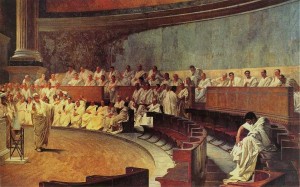
It’s astonishing how poorly equipped many people are today to handle the art of rhetoric, as indicated by the puerile attempts to put down my friend Vero for being French. Independently of dealing with such unpleasantness, I have been corresponding with a sharp young man who is interested in improving his knowledge of the world, and at the same time sharpening his skills in discussion and debate. It’s commonly assumed that those are contrary goals, but, in fact, thinking, discussing, writing, and debating, if done well, are mutually reinforcing. I recommended strongly George Orwell’s marvelous essay “Politics and the English Language,” from which I have learned much, as well as Cicero’s De Inventione, which has helped me on numerous occasions.
Rhetoric is a vital element of a free society, as it is an alternative to violence. It’s also a central element in the development of civil society, which is a topic I treat of historically in the chapter on “Classical Liberalism and Civil Society” in my Realizing Freedom: Libertarian Theory, History, and Practice. (It’s not too late to order your copy for Valentine’s Day for that special person… 😉 )










Nicholas Capaldi’s The Art of Deception is a very readable introduction to logical fallacies, with an emphasis on how to defend oneself against them. Among my favorites are the Appeal to Authority, the Appeal to Popular Sentiment, the Appeal to Tradition, and Ad Hominem, without which academic research in the social sciences would grind to a halt.
For economic policy debates, Carlo Cipolla’s article “The Basic Laws of Human Stupidity” is indispensable. http://finance.chyden.net/?p=493 (This is a blog post that summarizes the article and includes a link to the article, which tends to pop up and then disappear again on the Internet from time to time.)
With regard to the poverty of rhetoric, I despair, when I encounter increasing numbers of individuals, who seem to operate according to the dictum that the debate goes to him or her who can say, “nuh UH!!!” the loudest.
Thanks for the useful link to the Cipolla article! I greatly admire Cipolla’s economic history and benefited from his “Clocks and Culture” (http://www.amazon.com/Clocks-Culture-1300-1700-Carlo-Cipolla/dp/0393324435/ref=sr_1_3?ie=UTF8&s=books&qid=1265174084&sr=1-3 ) and “Before the Industrial Revolution” (http://www.amazon.com/Before-Industrial-Revolution-European-1000-1700/dp/0393311988/ref=sr_1_1?ie=UTF8&s=books&qid=1265174057&sr=1-1 ). They’re both brilliant. I used the latter in a chapter of a book on morality and poverty coming out from Cambridge University Press later this year. His depictions of poverty before the industrial revolution are quite vivid and helpful. (I also drew from Angus Maddison’s statistical studies, Deirdre McCloskey’s economic history, and the great Thomas Babington Macaulay.)
As to Capaldi’s book, I read it a very long time ago, and should revisit it, but I don’t quite agree that the Appeal to Authority is a logical fallacy. It’s just a very weak argument. As Thomas Aquinas put it in the Summa Theologiae, “as Boethius says, the argument from authority is the weakest argument.” (You can imagine how that had them rolling in the aisles in the thirteenth century.)